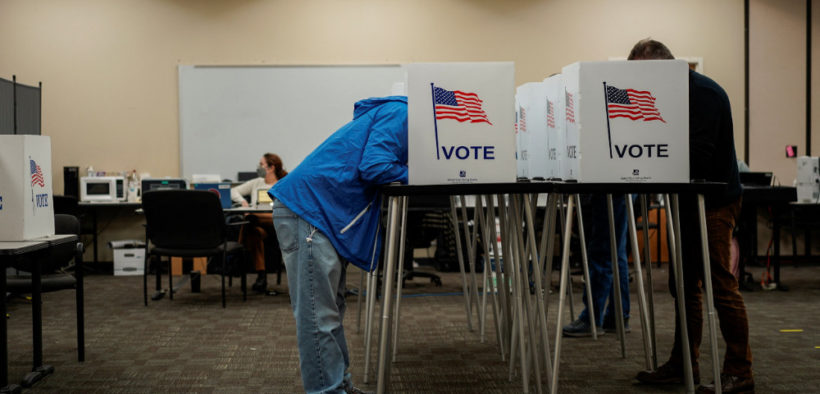WASHINGTON (OSV News) — The 2022 midterm elections Nov. 8 will decide the balance of congressional power for the remainder of President Joe Biden’s current term in the White House. And those results may lead to a mixed bag of legislative results on issues of importance to Catholics.
Midterm elections are often seen as a referendum on the sitting U.S. president and his party. Historically, the president’s party loses some congressional seats in a midterm election cycle.
Republicans have sought to continue this trend by hitting Biden on issues like inflation, crime and immigration. Biden and Democrats, meanwhile, have sought to highlight the president’s record on job creation, while attacking Republicans on abortion access following the U.S. Supreme Court’s Dobbs v. Jackson Women’s Health Organization decision in June, which struck down the high court’s prior rulings broadening abortion access in both Roe v. Wade (1973) and Planned Parenthood v. Casey (1992).
Democrats have also criticized the GOP for running candidates who sought to thwart or otherwise refuse to accept the outcome of the 2020 elections, calling the trend a threat to democracy.
Shortly before the elections, projections showed Republicans with the momentum. A Nov. 4 FiveThirtyEight analysis showed Republicans’ odds of winning the Senate at 55/100, and the House at 85/100.
“The landscape is more challenging for Catholics than it ever has been,” Mandy Cox, director of member services and communication for the Colorado-based Catholic Benefits Association, a group that works to protect the conscience rights of Catholic employers in policymaking, told OSV News.
Cox said Catholics should vote with informed conscience, as a “set it and forget it” political approach to party-line voting would be detrimental for Catholics on a number of key issues. While Catholics once might have assumed a political party is a safe choice for their values, “I actually think it’s more nuanced than that for Catholics now,” she said.
If Democrats maintain current control
Catholics face three different scenarios with the midterm elections, depending on whether Capitol Hill is controlled by Democrats, Republicans or equally divided between the two.
If Democrats maintain their current congressional majorities, they will likely move to expand abortion access in federal law.
Biden and Democratic candidates embraced abortion access as a key part of their pitch to voters in the wake of the Dobbs decision.
The Biden administration backed the Women’s Health Protection Act, legislation that would make it a legal right for a woman to undergo an abortion procedure, as well as override certain state laws restricting those procedures, including mandatory waiting periods or ultrasounds, bans on abortions via telemedicine, or requiring providers to have admitting privileges nearby hospitals.
House Democrats have twice passed the Women’s Health Protection Act, but the bill went on to fail on procedural votes both times in the Senate, unable to clear the 60-vote filibuster threshold.
Matthew Green, a professor of politics at The Catholic University of America in Washington who studies Congress and American elections, told OSV News that “there could be a lot of pressure to weaken or eliminate the filibuster if it’s seen as preventing the majority party from doing what it wants on abortion.”
“Both parties have been willing to weaken the filibuster in past years to get what they want,” he said, adding that Democrats may seek to do so on abortion legislation if they expand their majority.
Biden himself made that argument Nov. 4, writing on Twitter, “If we elect two more Democrats to the Senate and keep control of the House, we’re going to codify Roe v. Wade in January so it’s the law of the land.”
If Democrats maintain or grow their majorities, they may also revisit attempts to address climate change, immigration reform or voting rights legislation, three of their remaining key agenda items that dovetail with concerns raised by the US Conference of Catholic Bishops and other Catholic groups.
Democrats may also look to revive the expanded child tax credit, as a way to support families and alleviate poverty. The measure expired earlier this year after Sen. Joe Manchin (D-W.Va.) withdrew his support for its inclusion in Biden’s “Build Back Better” legislative priorities.
If Republicans win the House, Democrats keep the Senate
If Republicans win the House, Biden would have to navigate a divided Congress for the first time as president. In an increasingly polarized Congress, this would likely increase the potential for clashes between the two parties’ agendas as well as between their members.
House Minority Leader Kevin McCarthy (R-Calif.), who is seen as the most likely contender for Speaker of the House if Republicans win a majority, has signaled that the GOP would likely oppose providing more sweeping aid to Ukraine as the country fends off Russia’s invasion.
Green noted that anti-Ukraine rhetoric from some Republican lawmakers has plagued some Republican candidates, including “Hillbilly Elegy” author J.D. Vance, who is running for Senate as a Republican in Ohio, a state with a significant Ukrainian population.
A Republican House majority would likely target the Biden administration’s U.S.-Mexico border policies, as well as its responses to inflation and the COVID-19 pandemic.
House Republicans may take up a proposal to ban elective abortions after 15 weeks of pregnancy, but that legislation would be unlikely to clear the Senate, where Democrats would oppose it. Some Republicans have also indicated they would rather leave the issue to the states to legislate.
CBA’s Mandy Cox said House Republicans could result in more congressional oversight of Biden administration policies on abortion and contraception, which can affect Catholic employers of small and large businesses.
“I think at the very least right now, if they could hold back the needle from moving in a direction that I don’t know how to come back from, that’s also a win,” she said.
House Republicans have also indicated they may launch investigations in retaliation for investigations into the Trump administration, potentially investigating the president’s son Hunter Biden’s business dealings, or investigating the committee investigating the Jan. 6, 2021, riot at the U.S. Capitol. Some Republicans have even called for an effort to impeach Biden, although others have sought to downplay those calls.
Republicans’ other plans remain somewhat vague for a potential House majority. Their “Commitment to America” plan released earlier this year pledged items like curbing wasteful spending, but provided little insight on how they would go about the prospect.
House Republicans would be less likely than Senate Republicans to consider reviving the 2021 Child Tax Credit, and are likely to prefer a version that includes work requirements.
Biden’s campaign promise to repeal the federal death penalty, which he has only suspended, also faces less likely prospects in this scenario.
Democratic Rep. Ayanna Pressley (Mass.) and Sen. Dick Durbin (Ill.) introduced a bill to repeal the federal death penalty last year, with a Republican co-sponsor, Rep. Peter Meijer (Mich.) who is not returning to Congress next year after losing a primary challenge.
Congress never voted on the bill, which was backed by the USCCB and other Catholic groups.
If Republicans win both chambers
If Republicans win majorities in both the House and Senate, both Biden and Republicans would have to scale back their legislative goals. Biden’s veto pen would stymie some Republican campaign promises such as stricter immigration policies, while Republican majorities would present significant roadblocks to Biden’s remaining agenda items including proposals to prevent climate change.
An evenly divided Senate during the first half of Biden’s term did provide some opportunities for bipartisanship, such as a modest-in-scope bill combating gun violence, and the Bipartisan Infrastructure Law. But such opportunities would likely decrease as the 2024 presidential campaign cycle begins following the midterm elections, which would leave Republicans wary of handing Biden and his party legislative victories.
One potential area for bipartisan cooperation would be if the Senate chose to pursue a compromise bill on reviving the Child Tax Credit, although that measure would face steep obstacles in a Republican House.
Republicans including Sens. Mitt Romney (Utah) and Marco Rubio (Fla.) have offered their own alternatives to the measure, indicating there is the potential for Republican bipartisanship on the matter in the Senate.
A Republican Senate majority would also be able to block Biden’s judicial nominees, including nominees to any vacancies that may arise on the Supreme Court. McConnell notably blocked then-President Barack Obama’s nomination of Merrick Garland, who is now U.S. attorney general, to the high court in 2016 following the death of the late Justice Antonin Scalia.
Even after Roe’s reversal, the Supreme Court will continue to consider cases of great importance to Catholics on a wide variety of issues, such as religious freedom.
Kate Scanlon is National Reporter for OSV News covering Washington.










































